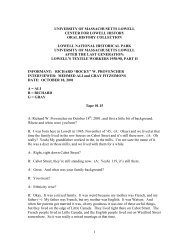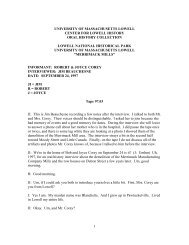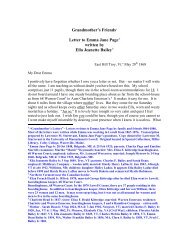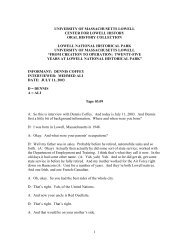LOOM AND SPINDLE OR Life Among the Early Mill Girls WITH A ...
LOOM AND SPINDLE OR Life Among the Early Mill Girls WITH A ...
LOOM AND SPINDLE OR Life Among the Early Mill Girls WITH A ...
Create successful ePaper yourself
Turn your PDF publications into a flip-book with our unique Google optimized e-Paper software.
seen anywhere so assiduous note-taking. No, not even in a college class, . . . as in that<br />
assembly of young women, laboring for <strong>the</strong>ir subsistence."<br />
To introduce a more practical side of <strong>the</strong>ir character I will quote an extract from a letter<br />
received not long ago from a gentleman in <strong>the</strong> Detroit Public Library, which says, "The<br />
factory-girls went to Lowell from <strong>the</strong> hills of Vermont when I was a boy, numbers of<br />
<strong>the</strong>m from every town in my county (Windsor); and it was considered something of a<br />
distinction to have worked for '<strong>the</strong> corporation,' and brought home some hard cash, which<br />
in many and many cases went to help lift a mortgage on <strong>the</strong> farm, or to buy something<br />
needed for <strong>the</strong> comfort of <strong>the</strong> old folks, or to send a younger bro<strong>the</strong>r or sister to <strong>the</strong><br />
Academy. I knew several of <strong>the</strong>se girls who brought home purses from Lowell which<br />
looked big in those days, and I recall one who is still living in my native town of<br />
Pomfret."<br />
It may be added here, that <strong>the</strong> majority of <strong>the</strong> mill-girls made just as good use of <strong>the</strong>ir<br />
money, so newly earned, and of whose value <strong>the</strong>y had hi<strong>the</strong>rto known so little. They were<br />
necessarily industrious. They were also frugal and saving. It was <strong>the</strong>ir custom on <strong>the</strong> first<br />
day of every month, after paying <strong>the</strong>ir board-bill ($1.25 a week), to put <strong>the</strong>ir wages in <strong>the</strong><br />
savings-bank. There <strong>the</strong> money stayed, on interest, until <strong>the</strong>y withdrew it, to carry home<br />
or to use for a special purpose. It is easy to see how much good this sum would do in a<br />
rural community where money, as a means of exchange, had been scarce. Into <strong>the</strong> barren<br />
homes many of <strong>the</strong>m had left it went like a quiet stream, carrying with it beauty and<br />
refreshment. The mortgage was lifted from <strong>the</strong> homestead; <strong>the</strong> farmhouse was painted;<br />
<strong>the</strong> barn rebuilt; modern improvements (including Mrs. Child's "Frugal Housewife "–<strong>the</strong><br />
first American cook-book) were introduced into <strong>the</strong> mo<strong>the</strong>r's kitchen, and books and<br />
newspapers began to ornament <strong>the</strong> sitting-room table.<br />
Some of <strong>the</strong> mill-girls helped maintain widowed mo<strong>the</strong>rs, or drunken, incompetent, or<br />
invalid fa<strong>the</strong>rs. Many of <strong>the</strong>m educated <strong>the</strong> younger children of <strong>the</strong> family, and young<br />
men were sent to college with <strong>the</strong> money furnished by <strong>the</strong> untiring industry of <strong>the</strong>ir<br />
women relatives.<br />
Indeed, <strong>the</strong> most prevailing incentive to our labor was to secure <strong>the</strong> means of education<br />
for some male member of <strong>the</strong> family. To make a gentleman of a bro<strong>the</strong>r or a son, to give<br />
him a college education, was <strong>the</strong> dominant thought in <strong>the</strong> minds of a great many of <strong>the</strong>se<br />
provident mill-girls. I have known more than one to give every cent of her wages, month<br />
after month, to her bro<strong>the</strong>r, that he might get <strong>the</strong> education necessary to enter some<br />
profession. I have known a mo<strong>the</strong>r to work years in this way for her boy. I have known<br />
women to educate by <strong>the</strong>ir earnings young men who were not sons or relatives. There are<br />
men now living who were helped to an education by <strong>the</strong> wages of <strong>the</strong> early mill-girls.<br />
In speaking of this subject, Mr. Thomas Wentworth Higginson says,–<br />
"I think it was <strong>the</strong> late President Walker who told me that in his judgment one-quarter of<br />
<strong>the</strong> men in Harvard College were being carried through by <strong>the</strong> special self-denial and<br />
sacrifices of women. I cannot answer for <strong>the</strong> ratio; but I can testify to having been an











